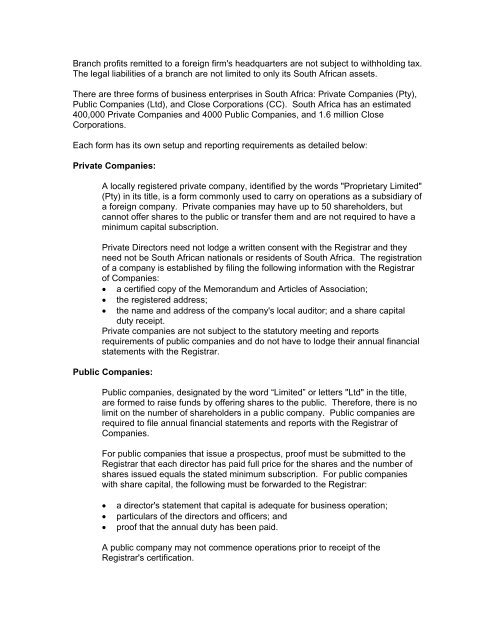South Africa - International Franchise Association
South Africa - International Franchise Association
South Africa - International Franchise Association
You also want an ePaper? Increase the reach of your titles
YUMPU automatically turns print PDFs into web optimized ePapers that Google loves.
Branch profits remitted to a foreign firm's headquarters are not subject to withholding tax.<br />
The legal liabilities of a branch are not limited to only its <strong>South</strong> <strong>Africa</strong>n assets.<br />
There are three forms of business enterprises in <strong>South</strong> <strong>Africa</strong>: Private Companies (Pty),<br />
Public Companies (Ltd), and Close Corporations (CC). <strong>South</strong> <strong>Africa</strong> has an estimated<br />
400,000 Private Companies and 4000 Public Companies, and 1.6 million Close<br />
Corporations.<br />
Each form has its own setup and reporting requirements as detailed below:<br />
Private Companies:<br />
A locally registered private company, identified by the words "Proprietary Limited"<br />
(Pty) in its title, is a form commonly used to carry on operations as a subsidiary of<br />
a foreign company. Private companies may have up to 50 shareholders, but<br />
cannot offer shares to the public or transfer them and are not required to have a<br />
minimum capital subscription.<br />
Private Directors need not lodge a written consent with the Registrar and they<br />
need not be <strong>South</strong> <strong>Africa</strong>n nationals or residents of <strong>South</strong> <strong>Africa</strong>. The registration<br />
of a company is established by filing the following information with the Registrar<br />
of Companies:<br />
• a certified copy of the Memorandum and Articles of <strong>Association</strong>;<br />
• the registered address;<br />
• the name and address of the company's local auditor; and a share capital<br />
duty receipt.<br />
Private companies are not subject to the statutory meeting and reports<br />
requirements of public companies and do not have to lodge their annual financial<br />
statements with the Registrar.<br />
Public Companies:<br />
Public companies, designated by the word “Limited” or letters "Ltd" in the title,<br />
are formed to raise funds by offering shares to the public. Therefore, there is no<br />
limit on the number of shareholders in a public company. Public companies are<br />
required to file annual financial statements and reports with the Registrar of<br />
Companies.<br />
For public companies that issue a prospectus, proof must be submitted to the<br />
Registrar that each director has paid full price for the shares and the number of<br />
shares issued equals the stated minimum subscription. For public companies<br />
with share capital, the following must be forwarded to the Registrar:<br />
• a director's statement that capital is adequate for business operation;<br />
• particulars of the directors and officers; and<br />
• proof that the annual duty has been paid.<br />
A public company may not commence operations prior to receipt of the<br />
Registrar's certification.
















